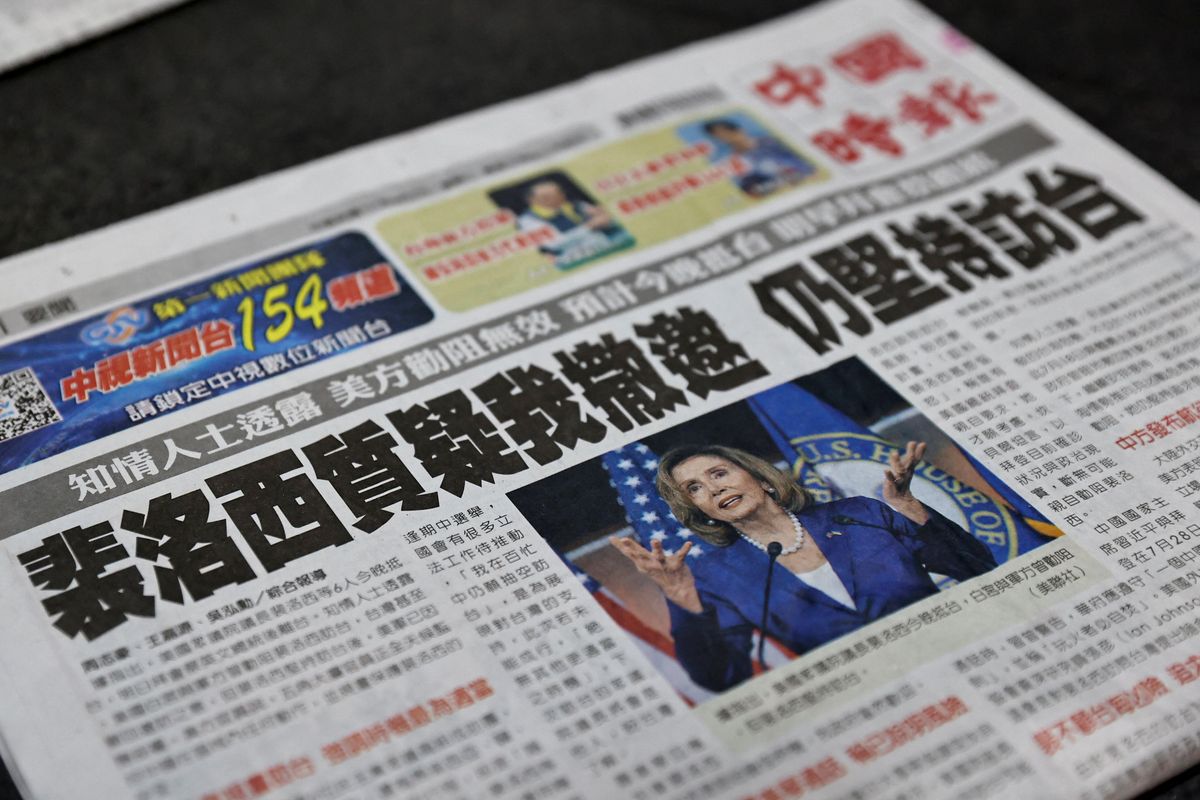Now that US House Speaker Nancy Pelosi has left Taiwan, most of the attention will likely shift to how China responds, how the US responds to China's response, and how this all plays out in US domestic politics. But spare a thought for the self-governing democratic island of 23 million caught in the crossfire between Beijing and Washington.
If you put yourself in Taiwan's shoes, the stakes cannot be higher. On the one hand, you've got mighty China encircling your territorial waters, swarming your skies with fighter jets, and turning away your food shipments because you invited the third-ranking US government official to stop by on her Asian tour.
On the other hand, you've also got America, which officially doesn't recognize you but is committed to helping you defend yourself from China. You know that, whatever Pelosi or President Joe Biden say, the US won’t actually defend you from a Chinese invasion, which nowadays doesn't seem as far off as it did a few years ago.
Still, Pelosi certainly felt the love in Taipei. That's hardly a surprise because symbolism matters as much to the Taiwanese as to the mainland Chinese. The latter always freak out when US officials visit Taiwan, which Beijing calls the 23rd province of the People’s Republic. After all, China knows how popular Americans are there.
"Taiwan stands to gain an assurance of moral (hence symbolic) support from Pelosi's visit," says Titus Chen, an associate professor at National Sun Yat-Sen University. "It may not mean much to American politicians, but decades of diplomatic isolation and political frustration have led people … to place a great deal of emphasis on foreign leaders' symbolic recognition of Taiwan's importance and achievements."
This sentiment, Chen explains, "runs deep in Taiwanese society, and nearly all politicians subscribe to it." And he believes the ruling Democratic Progressive Party of President Tsai Ing-wen — which advocates independence from China — will benefit politically.
The question is whether Tsai’s party can ride the Pelosi bump to victory in big local elections this November, Taiwan’s answer to the US midterms.
Pelosi's warm reception in Taipei is expected to boost Tsai’s approval ratings, and it may also benefit DPP candidates. But recent controversies linked to some of them might hurt their chances.
"It's hard to say that the ruling party can take all of the credit [from the visit] and win the local elections," says Tsai Chia-hung, director of the Election Study Center at the National Chengchi University in Taipei. Though it’s possible, he adds, that people will pay less attention right now to DPP-related scandals.
Also, this year’s local vote is more consequential than usual because it'll set the stage for the 2024 presidential election.
The center-left DPP has no clear candidate to replace the term-limited Tsai, who won the 2016 and 2020 elections in landslides, and, more importantly, unified the party’s warring factions. Meanwhile, the center-right opposition Kuomintang Party, which wants reunification with China, hopes that whoever succeeds Tsai will neither keep the party together nor have her magic touch with young voters.
China wants the Kuomintang back in power. China-Taiwan ties reached their warmest point in decades in the early 2010s under the Kuomintang presidency of Ma Ying-jeou, who in 2015 met Xi Jinping in the historic first (and so far only) “summit” between the leaders of the People’s Republic and Taiwan since the end of China's Civil War in 1949.
Meanwhile, the Taiwanese people know they're in for tough weeks and months ahead with an angry China. Most are ready for what's coming: more military muscle-flexing and tougher trade sanctions. But at least some Taiwanese will wonder whether Pelosi’s visit was worth the trouble.
Still, the actions so far "are mostly symbolic gestures, and China is actually careful not to escalate the tensions," Chen adds. "Taiwan will sustain some minor symbolic losses, but overall the government and the people here are ready to withstand pressure from China."


















